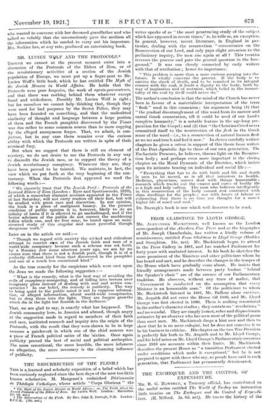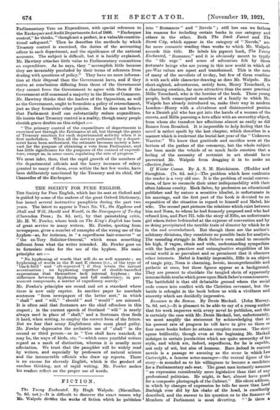THE EXCHEQUER AND THE CONTROL OF EXPENDITURE.
Mn. R. G. Haw-TREY, a Treasury official, has contributed to the useful series entitled The World of To-day an instructive little treatise on The Exchequer and the Control of Expendi- ture. (H. Milford. 2s. 6d. net). He traces the history of the Parliamentary Veto on Expenditure, with special reference to the Exchequer and Audit Departments Act of 1866. " Exchequer control," he thinks, " though not a perfect, is a valuable constitu- tional safeguard." Then he describes the methods by which Treasury control is exercised, the duties of the accounting officer in each department, and the significance of the national accounts. The subject is difficult, but it is lucidly explained. Mr. Ilawtre-y attaches little value to Parliamentary committees on expenditure. As he says, they " accomplish little because they are invariably precluded by -their terms of reference from dealing with questions of policy." They have no more informa- tion at their disposal than the Government have, and ff they arrive at conclusions differing from those of the Government they cannot force the Government to agree with them if the Government still command a majority in the House of Commons. Mr. Hawtrey thinks that the leaders of the Opposition, as well as the Government, ought to formulate a policy of retrenchment, just as they formulate other policies. But he does not believe that Parliament itself can substantially reduce expenditure. He insists that Treasury control is a reality, though many people cherish grave doubts on this.subject:— " The primary control of the expenditure of departments is exercised not through the Estimates at all, but through the grant of Treasury sanction for each departmental activity when it is first undertaken. When all the services performed by a depart- ment have been-authorized, the estimate becomes merely a fore- cast for the ,purpose of obtaining a vote from Parliament, and has little significance for the purposes of the control of expendi- ture, except 118, in some cases, regulating the rate of progress."
We must infer, then, that the rapid growth of the numbers of the departmental officials and the heavy increases of salary granted to many of them, even within the last few weeks, have been deliberately sanctioned by the Treasury and its chief, the Chancellor 4:d the. Exchequer.







































 Previous page
Previous page